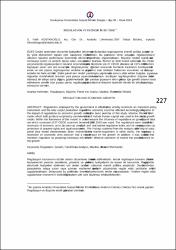| dc.contributor.author | Kostakoğlu, Fatih S. | |
| dc.date.accessioned | 2019-10-20T21:12:45Z | |
| dc.date.available | 2019-10-20T21:12:45Z | |
| dc.date.issued | 2014 | |
| dc.identifier.issn | 1302-1842 | |
| dc.identifier.uri | http://www.trdizin.gov.tr/publication/paper/detail/TVRZd01EY3lNZz09 | |
| dc.identifier.uri | https://hdl.handle.net/11421/19096 | |
| dc.description.abstract | Devlet tarafından ekonomik faaliyetleri etkilemek için kullanılan regülasyonlar önemli politika araçlarıdır ve bu yolla ekonominin toplam çıktı kapasitesi etkilenmektedir. Bu çalışmanın temel dayanağını regülasyonların ülkelerin büyüme performansı üzerindeki etkilerinin araştırılması oluşturmaktadır. Büyüme modeli olarak beşeri sermayeyi içeren ve ampirik olarak tutarlı sonuçlar üreten Mankiw, Romer ve Weil model kullanılmıştır. Bu model çerçevesinde regülasyonların büyüme üzerindeki etkisinin ölçülmesi için 27 OECD ülkesine ait 1975-2010 dönemini kapsayan panel veri seti kullanılmıştır. Regülasyonlar, doğrudan ekonomik birimlerin kararlarını kısıtlayan kredi, emek ve reel piyasa regülasyonları endeksi ve piyasa yanlısı olan mülkiyet haklarının korunması ve hukuki yapı endeksi ile ifade edilmiştir. Statik panel veri modeli yardımıyla yapılan analiz sonucu elde edilen bulgular, piyasaya doğrudan müdahalede bulunan yani piyasa oyuncularının kararlarını kısıtlayan regülasyonların büyüme üzerinde olumsuz bir etkiye sahip olduğunu göstermektedir. Diğer yandan piyasanın etkin çalışması için gerekli ortamın tesis edilmesine yönelik olan piyasa yanlısı regülasyon uygulamalarının büyüme üzerinde olumlu bir etkiye sahip olduğu sonucuna varılmıştır. | en_US |
| dc.description.abstract | Regulations employed by the government to affect economic activity constitute an important policy instrument, and the total output production capacity of the economy could be affected accordingly. Investigation of the impact of regulations on economic growth underpins the basic premise of this study. Mankiw, Romer and Weil model which both produce empirically consistent result and include human capital was used in the study as a growth model. Within the framework of this model, in order to measure the influence of regulations on growth, a panel data set which consisted of 27 OECD countries between 1975 and 2010 was used. The regulations were stated for direct restriction of economic units decision as credit, labor and real market regulation index and for market-supporters as protection of property rights and legal structure index. The findings obtained from the analysis with the help of static panel data model demonstrated direct intervention of the market-supporters in other words, the regulation as a restriction on economic units decision had a negative impact on the growth. In addition, it was concluded that marketer regulation as providing necessary environment for effective operation of market had positive influence on the growth. | en_US |
| dc.language.iso | tur | en_US |
| dc.rights | info:eu-repo/semantics/openAccess | en_US |
| dc.subject | Sosyal Bilimler | en_US |
| dc.subject | Disiplinler Arası | en_US |
| dc.title | Regülasyon ve ekonomik büyüme | en_US |
| dc.title.alternative | Regulatıon and economıc growth | en_US |
| dc.type | article | en_US |
| dc.relation.journal | Dumlupınar Üniversitesi Sosyal Bilimler Dergisi | en_US |
| dc.contributor.department | Anadolu Üniversitesi, İktisadi ve İdari Bilimler Fakültesi, İktisat Bölümü | en_US |
| dc.identifier.volume | 0 | en_US |
| dc.identifier.issue | 39 | en_US |
| dc.identifier.startpage | 227 | en_US |
| dc.identifier.endpage | 242 | en_US |
| dc.relation.publicationcategory | Makale - Ulusal Hakemli Dergi - Kurum Öğretim Elemanı | en_US] |


















